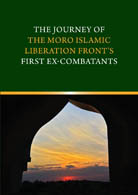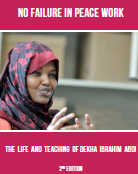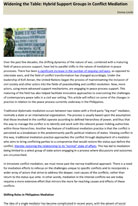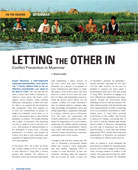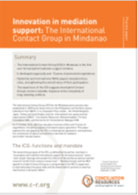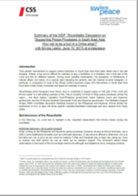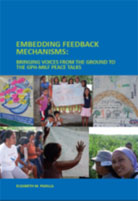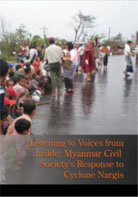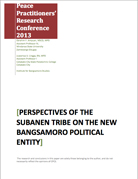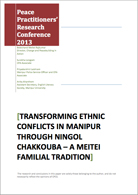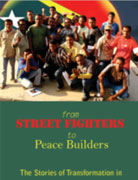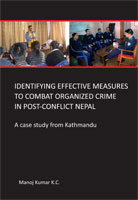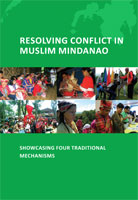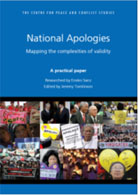CATEGORIES
LISTENING – LEARNING – RESEARCH & ANALYSIS – PEACE HISTORY – THE LIVES OF PEACEBUILDERS
PLACES: CAMBODIA – MYANMAR – PHILIPPINES – NEPAL – INDIA – SRI LANKA – TIMOR LESTE – KOREAN PENINSULA – THAILAND
Below are all the CPCS publications and research papers in chronological order. Please use the Search function, the tag cloud on the right or the category links above for more refined browsing.
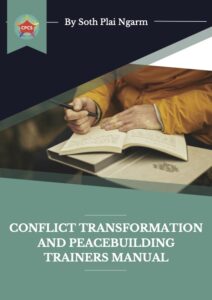
Conflict Transformation and Peacebuilding Trainers Manual
Author: Soth Plai Ngarm
Publisher: Centre for Peace and Conflict Studies
Published Date: April 2025
As a trainer in the field of conflict transformation, you are not only an educator but also a facilitator of change; conflict, when approached with the right mindset and tools, can be a catalyst for growth, healing, and long-term peace. The trainer’s role in guiding others through the principles and practices of conflict transformation is critical in shaping the future of how we address and resolve conflicts on every level, whether within communities, organizations, or even globally. This manual will show you how to think beyond traditional conflict resolution and learn to address the root causes of conflict, build trust, empower individuals, and promote systemic change that is just and sustainable.
The ‘Conflict Transformation and Peacebuilding Trainers Manual’ builds on thirty years of experience in training peace practitioners, academics, and community leaders with the foundational knowledge, methodologies, and practical approaches to effectively teach and mentor others in the art of conflict transformation. While not a replacement for training, this manual provides a comprehensive collection of guidelines, approaches, and exercises that can enhance conflict transformation and peacebuilding training for all audiences.
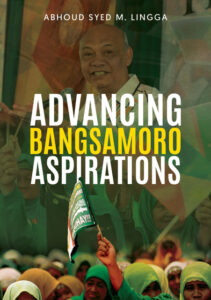
Advancing Bangsamoro Aspirations
“Advancing Bangsamoro Aspirations” captures the essence of the Bangsamoro people’s journey towards self-determination and peace. This collection of writings by Professor Abhoud Syed M. Lingga offers a unique narrative of their struggle, exploring the legal and political frameworks involved, and examining the broader implications for both national and international peacebuilding. Published in 2024, the 10th anniversary of the Comprehensive Agreement on the Bangsamoro, the book provides valuable insights into the historical context, the challenges faced, and the ongoing efforts to build a peaceful and prosperous future for the Bangsamoro. It is an essential resource for anyone seeking to understand the complexities of the Bangsamoro peace process and the enduring pursuit of self-determination. This publication was made possible with the funding support of Misereor.
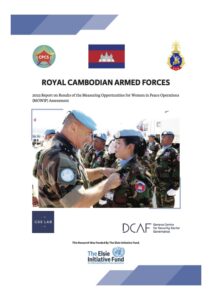 Measuring Opportunities for Women in Peace Operations (MOWIP) in Cambodia Report
Measuring Opportunities for Women in Peace Operations (MOWIP) in Cambodia Report
Published: August 2024
Country: Cambodia
Language: English and Cambodian
Cambodia demonstrates its commitment to strengthening the role of women in Peacekeeping missions, ranked 17th worldwide and second in Asia for gender parity in their contingents. Further demonstrating its commitment to Women Peace and Security, the Royal Cambodian Armed Forces (RCAF), through the National Center for Peacekeeping Force, Mine and ERW Clearance (NPMEC) partnered with CPCS and UN Women Cambodia to conduct the “Measuring Opportunities for Women in Peace Operations (MOWIP)” Barriers Assessment in 2023 – 2024.
Utilizing the MOWIP developed by Geneva Centre for Security Sector Governance (DCAF) and Cornell University, this report offers a comprehensive set of recommendations aimed at enhancing gender equality within Cambodia’s armed forces. It showcases best practices from the Royal Cambodian Armed Forces (RCAF), illustrating their exemplary performance in integrating gender considerations into peacekeeping operations.
The findings of this research will serve as a critical resource for guiding policy formulation and institutional reforms, addressing challenges to women’s full and meaningful participation in military roles. Key recommendations include fostering an enabling environment through official parental leave policies, challenging prevailing gender norms, and strengthening gender sensitivity programs within RCAF policies.
With funding support from the Elsie Initiative Fund (EIF).
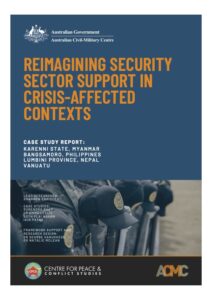
Reimagining Security Sector Support in Crisis-Affected Contexts
Published by: Australian Civil-Military Centre (ACMC) and Centre for Peace & Conflict Studies (CPCS)
Published: November 2024
Language: English
The report, Reimagining Security Sector Support in Crisis-Affected Contexts, produced in collaboration with the Australian Civil-Military Centre (ACMC), explores the evolving landscape of community safety, security, and policing in conflict-affected regions. It focuses on case studies from Karenni State in Myanmar, Bangsamoro in the Philippines, Lumbini Province in Nepal, and Vanuatu.
The report highlights the critical importance of community security in relation to peace and conflict, emphasising that feelings of safety are essential at all stages of conflict. By drawing on cross-context comparative learning, it offers valuable insights into effective security sector governance and community engagement. Key findings reveal that inclusive approaches to security not only address immediate safety concerns but also contribute to long-term peace and stability. It encourages community engagement and the integration of diverse perspectives in promoting sustainable peace and security.
Author: Centre for Peace & Conflict Studies (CPCS)
Published by: CPCS
Publication date: September 2020
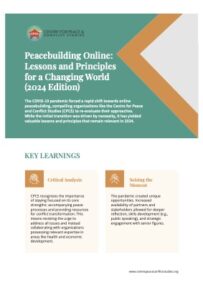 Peacebuilding Online
Peacebuilding Online
Lessons and Principles for a Changing World
(2024 edition)
Publisher: Centre for Peace and Conflict Studies
Date of Publishing: December 2024
Country: Cambodia
Language: English
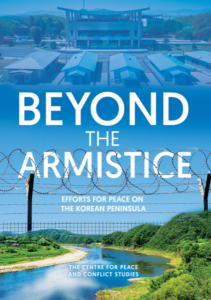
Beyond the Armistice
Efforts for Peace on the Korean Peninsula
Publisher: Centre for Peace and Conflict Studies
Date of Publishing: October 2023
Country: Cambodia
Language: English
The book “Beyond the Armistice – Efforts for Peace on the Korean Peninsula” is a compilation of interviews with individuals from different countries, sectors, and generations, who are committed to advocating peace on the Korean Peninsula. These individuals, which include civil society leaders, former policymakers, diplomats, aid experts, and educators, share their journeys in peacebuilding or efforts in engaging in dialogues. Their insights shed light on the complexities of the Korean Peninsula tension, where the unresolved Korean War has caused structural injustices for over seven decades that sustain a system of division and play a significant role in rising tensions and hostilities on the Peninsula and beyond. They urge for an immediate resumption of dialogue to reduce tension and rebuild trust, calling for a cessation of hostilities by all parties, a shift from a militarised security narrative, and a more robust, inclusive process for peace that includes the voices of people affected by the conflict. The book documents a variety of suggestions and recommendations for the policy community and civil society groups to work together towards achieving these goals.
The Centre for Peace and Conflict Studies would like to express its sincere gratitude to Misereor for their support in creating this publication, as well as to GPPAC Northeast Asia for their financial assistance in printing it. While Misereor and GPPAC provided financial backing for this project, the viewpoints and ideas expressed in the publication are solely those of the contributors and do not necessarily reflect the positions of Misereor and GPPAC.
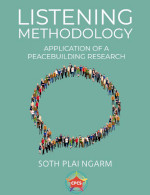 Listening Methodology
Listening Methodology
Application of a Peacebuilding Research
Author: Soth Plai Ngarm
Published by: CPCS
Published date: September 2022
The Listening Methodology is a qualitative research approach seeking to capture the feelings, thoughts, and opinions of communities living in a conflict to collect a unified voice and help amplify voices sidelined in peace processes. This manual briefly describes the listening methodology which aims to help conflict research practitioners develop and operate a listening project effectively.
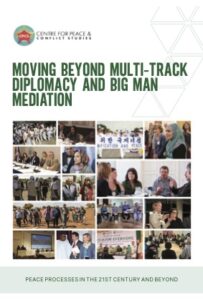 Moving Beyond Multi-Track Diplomacy and Big Man Mediation
Moving Beyond Multi-Track Diplomacy and Big Man Mediation
Author: Emma Leslie, Shadia Marhaban, Meredith Preston McGhie, Ameya Kilara, Julia Roig, Christine Ahn, and Neha Sanghrajka
Published by: CPCS
Publication date: February 2022
What is mediation in the 21st century? What does it mean to be a peace leader in this time? How could organizations adapt to shocks like pandemics and ever-shifting dynamics? And why should we let go of the “big man” approach to solving conflicts?
We asked seven world-renowned peace leaders at the forefront of 21st-century mediation and peacebuilding to share their experiences and lessons learned to help answer these traditional approaches and inspire those who read it and work for peace everywhere. The writings in this book are excerpted from the 9th Asia Peace Practitioners Research Conference, hosted by the Centre for Peace and Conflict Studies in November 2020. These powerful words and engaging discussions reflect a significant shift in how mediation and peacebuilding are seen.
Videos of each chapter are available.
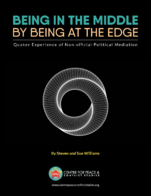 Being in the Middle By Being at the Edge
Being in the Middle By Being at the Edge
Author: Steven and Sue Williams
Published by: CPCS
Publication date: October 2020 (2nd Edition)
ISBN: 1 85072 13
This book elucidates the concrete experiences of the authors in political conflict mediation in Northern Ireland and Uganda. Written by two leading Quaker mediators, but, most case studies, quotes, stories and anecdotes described here are from a combination of sources that are useful to those who have acted as mediators and to anyone who may take on this kind of role in the future. Mediation and negotiation efforts described here provides different perspective of understanding political mediation. Engaging various key peace stakeholders in political settlement and utilizing the approach of working behind the scenes and leading from behind make all the processes possible.
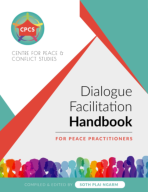 CPCS Dialogue Facilitation Handbook
CPCS Dialogue Facilitation Handbook
Author: Centre for Peace & Conflict Studies (CPCS)
Published by: CPCS
Publication date: May 2020
ISBN: N/A
This handbook does not aim to suggest how a dialogue is to be done, but to share about techniques, tips and tricks gathered from field experiences and research. Therefore, it is particularly for assisting trained facilitators with their task to facilitate dialogues, and it can be used as a resource material to train up dialogue facillators. We would not advise that someone can become a dialogue facilitator just by reading this handbook and receives no proper training and coaching. As our experiences reflect, to become an effective dialogue facilitator, one requires more than just natural talents, but also training, experiences and recognition by a wider group of people. Having training is better than just reading books because without proper training the person may make things worse, instead of improving the situation.
The handbook consists of three parts – 1. Concept and Theory, 2. Design, Planning and Preparation, and 3. Characteristics and Techniques. It provides a foundation that every dialogue facilitation skill should contain. We are aware of the importance of pre- and post-dialogue stages, which we did not cover so much in this handbook. However, we encourage facilitators to see dialogue as a process but not an event or a short-term project, to lay the ground work for furture dialogues to happen, to continue to explore answers about what’s next after dialogues, and to find how to build on the take-aways of participants and the common ground which they together have discovered. There are valuable things that can be picked from the dialogue and the direct encounter, which will help change the dialogue process.
We strongly hope that this handbook will be useful for practitioners as tools and resource materials in dialogue processes, as we believe that dialogue is one of the best ways to resolve conflicts and attain peace for human society.
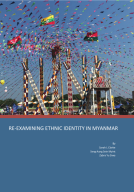 Re-examining Ethnic Identity in Myanmar
Re-examining Ethnic Identity in Myanmar
Author: Sarah L Clarke, Seng Aung Sein Myint, and Zabra Yu Siwa
Published by: CPCS
Publication date: May 31, 2019
ISBN: N/A
“Re-examining Ethnic Identity in Myanmar” re-examines ethnicity from the perspective of diverse Myanmar stakeholders. Emerging from a closer examination of historical experiences and grievances, this report seeks to uncover the ways that ethnic identity has been used for a variety of political purposes. The objective of this analysis is to bring complex root causes of armed conflict in Myanmar to the surface in order to better consider and identify strategies that address long-standing tensions and violence. The report explores these issues with reference to three case studies: one focused on Kachin ethnic identity, one on Arakanese ethnic identity, and one on Karen ethnic identity. The case studies provide additional historical background aimed at grounding the views raised by meeting participants and community stakeholders. The report concludes by considering a range of recommendations aimed at multiple Myanmar stakeholders, including leaders from a variety of ethnic communities, the Myanmar government, and international actors.
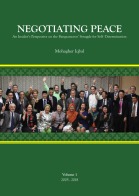 Negotiating Peace: An Insider’s Perspective to the Bangsamoros’ Struggle for Self-Determination
Negotiating Peace: An Insider’s Perspective to the Bangsamoros’ Struggle for Self-Determination
Author: Mohagher Iqbal
Published by: Centre for Peace & Conflict Studies (CPCS)
Publication date: 2018
ISBN: N/A
Negotiating Peace: An Insider’s Perspective to the Bangsamoros’ Struggle for Self-Determination is a compilation of MILF Implementing Panel Chairman Mohagher Iqbal’s speeches from 2005 to 2018. The book captures the historic events that shaped the peace process, and the wisdom, principles, and insights of the MILF in its engagement with the Philippine government to pursue the Bangsamoros’ aspirations.
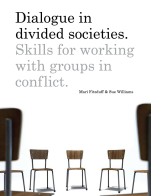 Dialogue in Divided Societies: Skills for Working with Groups in Conflict
Dialogue in Divided Societies: Skills for Working with Groups in Conflict
Authors: Mari Fitzduff and Sue Williams
Published by: Independently published
Publication date: January 2019
ISBN: 1794186476
If you’re interested in helping to solve societal and global conflicts, then you will find this book to be an invaluable resource. Dialogue in Divided Societies is written by two of the leading practitioners in the field of peacebuilding, and offers theories and exercises that have been tried and tested in some of the most challenging conflicts around the world.
The 101 exercises contained in this book will help to stimulate productive dialogue and navigate sensitive issues such as social exclusion, prejudice and discrimination, societal inequalities, distrustful relationships, issues of justice, sectarianism, racism and violence. Effective in both formal and informal situations, these exercises can be used with local, national or international
groups. They are designed to increase understanding and lead to sustainable agreements about what can facilitate more peaceful societies.
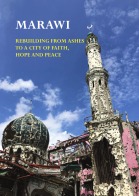 Marawi: Rebuilding from Ashes to a City of Faith, Hope and Peace
Marawi: Rebuilding from Ashes to a City of Faith, Hope and Peace
Author: Centre for Peace and Conflict Studies
Published by: Centre for Peace and Conflict Studies
Publication date: February 2019
On the 23rd of May 2017, the Armed Forces of the Philippines and the Philippines National Police conducted operations to capture Isnilon Hapilon, leader of the Abu Sayyaf Group, in Marawi after receiving reports that he would be meeting the Maute Group there. Armed clashes began when Hapilon’s forces fired on government forces, sparking a five month long siege. The scale of destruction and devastation as a result of the siege was catastrophic. It claimed the lives of over 1,000 people, displaced 350,000 and physically and psychologically injured many more. Moreover, the battle left the city in ruins and it is estimated that 95% of the city was damaged, with over 3,000 buildings completely destroyed, 900 heavily damaged and 1200 structures partially damaged.
The objective of this report is to collect the opinions, desires and challenges of the survivors in order to share their desire for the reconstruction of Marawi and their eventual return home. It is crucial that the government quickly take action, as a number of survivors are living in evacuation centres with little to no job opportunities, schools, and medical services, leaving many vulnerable and possibly susceptible to extremist ideologies.
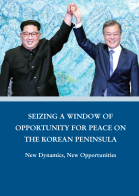 Seizing a Window of Opportunity for Peace on the Korean Peninsula
Seizing a Window of Opportunity for Peace on the Korean Peninsula
Author: Caroline Kearney
Published by: Centre for Peace & Conflict Studies (CPCS)
Publication date: January 2019
ISBN: N/A
This analysis was written after a series of Inter-Korean Summits and the DPRK-US Summit in Singapore. It was published in January 2019, one month before the Hanoi Summit. The author discussed why the unique window of opportunity must be capitalized on immediately, before it would expire as early as mid-2019.
The DPRK took several concrete measures to demonstrate their dedication to a negotiation process with the ROK and the US. Therefore, ahead of the Hanoi Summit, the onus lay on the US to participate in a reciprocal negotiation process by choosing to make equal concessions in kind. If not, the stalemate would continue and the citizens and government leaderships of all three countries would lose patience, and this exceptional opportunity would be forfeited.
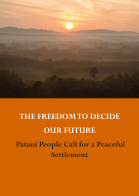 The Freedom to Decide Our Future: Patani People Call for a Peaceful Settlement
The Freedom to Decide Our Future: Patani People Call for a Peaceful Settlement
Author: Centre for Peace & Conflict Studies (CPCS)
Published by: Centre for Peace & Conflict Studies (CPCS)
Publication date: January 2019
The conflict in the three southernmost provinces of Thailand had taken close to seven thousand lives since it re-ignited in 2004 until 2018. At that time, the Thai State was engaged in a peace process with the MARA Patani, an umbrella organisation claiming to represent the insurgency from the South. However, the Barisan Revolusi Nasional (BRN), widely recognized as controlling most of the armed insurgents in the region, reportedly refused to participate in that peace process. In the midst of these high-level dynamics, a crucial and critical voice must be remembered – that of the every day people who are living in the heart of the conflict. How is the conflict affecting their lives? What is the impact of the 15 years of violence on their livelihoods, education, culture, identity and dignity? To find answers to these questions, researchers from the region employed CPCS’ Listening Methodology to better understand the opinions, perspectives and aspirations of the people living in these communities. This publication documents the results of this research – conducted in 2018 and published in 2019 – along with key emerging recommendations for the international community, the Thai State, the armed insurgent movement and the general public.
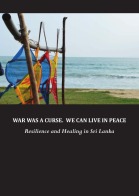 War Was a Curse. We Can Live in Peace. Resilience and healing in Sri Lanka.
War Was a Curse. We Can Live in Peace. Resilience and healing in Sri Lanka.
Author: Centre for Peace & Conflict Studies (CPCS)
Published by: CPCS
Publication date: December 2017
ISBN: 978-999-63
War Was a Curse. We Can Live in Peace: Resilience and healing in Sri Lanka presents the stories of 29 men and women who have lived through the 28-year civil war in Sri Lanka. Weaving together personal narratives from across the country, the book uses a Peace History lens to capture the grey between the black and white narratives that protracted conflicts produce and illustrates the main obstacles that must be overcome in order for Sri Lankans to move forward in peace.
The book organises personal narratives from all sides of the conflict into three parts: The Past, The Past is the Present and The Future, illustrating how the civil war continues to penetrate daily attitudes and views on reconciliation and shape a peoples’ hope for coming generations. While still raw and painful, the stories presented in this publication contribute to the on-going wider and inclusive conversation about a peaceful future for Sri Lanka. From what started as an exploration around views on reconciliation and healing, the book finds that before a transformation of attitudes can occur, the stories of Sri Lankans must be listened to and acknowledged.
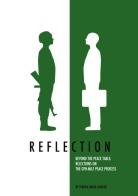 Beyond the Peace Table: Reflections on The GPH-MILF Peace Process
Beyond the Peace Table: Reflections on The GPH-MILF Peace Process
Author: Dato’ Tengku Abdul Ghafar
Published by: CPCS
Publication date: June 2017
ISBN: N/A
Beyond Peace Tables: Reflections on GPH-MILF Peace Process is a book written by the former Malaysian third-party facilitator of the Government of the Philippines (GPH) – Moro Islamic Liberation Front (MILF), Dato’ Tengku Abdul Ghafar. His tenure as facilitator culminated in the signing of the Comprehensive Agreement on the Bangsamoro (CAB) in May 2014. In the publication, Tengku Ghafar outlines the steps in the peace process towards the CAB, as well as the content of the agreement. In particular, he discusses how he handled impasses and tensions in negotiations through utilising less formal approaches, providing rich detail on the attitudes and behaviour of both parties from a third-party standpoint. The book also provides an explanation of the relevant peace infrastructure in the process, including the Framework Agreement on the Bangsamoro, the International Contact Group, and the different ceasefire monitoring mechanisms.
The book serves to inform the discussions on practical approaches and policy towards peace process facilitation. Peace processes rarely proceed without impasses or obstacles, and sharing Tengku Ghafar’s technique and observations widely enables their application to other on-going negotiations elsewhere.
 Strengthening Understanding through Dialogue: A Peacebuilding Approach to the Korean Peninsula Conflict
Strengthening Understanding through Dialogue: A Peacebuilding Approach to the Korean Peninsula Conflict
Author: Centre for Peace & Conflict Studies (CPCS)
Published by: CPCS
Publication Date: May 2017
ISBN: N/A
Strengthening Understanding through Dialogue is a conflict analysis that takes a peacebuilding approach to the Korean Peninsula conflict. The analysis focuses on the four governments that are party to the conflict – the Democratic People’s Republic of Korea, the Republic of Korea, the United States, and the People’s Republic of China – and outlines the role of each party in the key driving factors of the conflict. More importantly, the analysis emphasises that despite the roles these governments occupy in this conflict, they also retain the power to influence the course of the conflict, especially the US and DPRK.
The analysis is based on interviews conducted in 2016 with international non-government organisations and academics who have directly engaged with DPRK personnel. Published in May 2017, at the beginning of the Moon Jae-In Administration in the ROK and the Trump Administration in the US. its aim is to promote the consideration of a wider range of options available to the US, the ROK, and other international actors, who have the capacity to accompany a path to positive working relationships for the conflicting parties.
Strengthening Understanding through Dialogue demonstrates that it is only through deepening the understanding of each others’ perspectives and interests through engagement that the conflict parties can begin building the relationships required to transform the tensions in the Korean Peninsula conflict into sustainable diplomatic relations, and identifies several leverage points as possible steps towards this end.
- DOWNLOAD FULL PUBLICATION IN ENGLISH
- DOWNLOAD FULL PUBLICATION IN KOREAN
- DOWNLOAD FULL PUBLICATION IN CHINESE
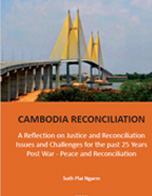 Cambodia Reconciliation: A Reflection on Justice and Reconciliation Issues and Challenges for the past 25 Years Post War – Peace and Reconciliation
Cambodia Reconciliation: A Reflection on Justice and Reconciliation Issues and Challenges for the past 25 Years Post War – Peace and Reconciliation
Author: Soth Plai Ngarm
Published by: CPCS
Publication Date: March 2017
This reflection paper highlights issues related to reconciliation in Cambodia, making the case that holistic reconciliation needs to address different levels of reconciliation – political, social and emotional. The paper serves to raise questions for further inquiry and discussion on what holistic reconciliation could look like in Cambodia, and the factors that need to be considered. While Cambodia has experienced political reconciliation, there has been no national process for healing or social reconciliation. This paper explores the different influencing factors and dynamics that are entwined with attitudes about reconciliation in Cambodia, including the roles of war-peace leaders in driving reconciliation, and the tensions between political ideologies and varying visions for a peaceful Cambodia. It also examines the role of judicial mechanisms, namely the Extraordinary Chambers of the Courts of Cambodia (ECCC), in offering reconciliation at the social or emotional levels.
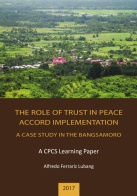 The Role of Trust in Peace Accord Implementation: A Case Study in the Bangsamoro
The Role of Trust in Peace Accord Implementation: A Case Study in the Bangsamoro
Author: Alfredo Ferrariz Lubang
Published by: CPCS
Publication Date: February 2017
ISBN: N/A
Originally conducted as an Action Research project for CPCS’ Applied Conflict Transformation Studies Master’s Programme, this publication explores the role of trust in implementing peace accords. Utilising the case of the peace process between the Moro Islamic Liberation Front (MILF) and the Government of the Philippines (GPH), the publication unpacks the concept of trust and how it can be nurtured. Considering trust from a societal approach, the publication seeks to answer the following three questions: 1) How do people define trust within the context of implementing a peace accord; 2) What are the important factors of trust in implementing a peace accord; and 3) What factors diminish trust during the implementation period.Through an analysis of a community survey, the research emphasises that trust plays an integral role in the successful implementation of a peace accord. Concluding that trust is a reflexive process in which individuals process trust through their own experiences and in turn share them with their community, the publication suggests that trust creates space for understanding and flexibility between parties, thereby enhancing the chance for peace to take root. Importantly, it also provides recommendations for stakeholders at various levels, including leaders of the MILF and GPH, implementers of the peace accords, and community residents, in order to better support the implementation of the peace process.
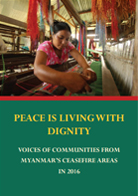 Peace is Living with Dignity: Voices of Communities from Myanmar’s Ceasefire Areas in 2016
Peace is Living with Dignity: Voices of Communities from Myanmar’s Ceasefire Areas in 2016
Author: Centre for Peace & Conflict Studies (CPCS)
Published by: CPCS
Publication Date: January 2016
ISBN: 13:978 99963 856 4 3
Peace is Living with Dignity showcases the second round of CPCS’ project listening to communities and their experiences with the peace process in Myanmar. Utilising CPCS Listening Methodology, the project aims to amplify the voices of people in ceasefire areas of Myanmar to inform and influence decision-makers in the peace process. Engaging communities in the same six states (Kachin, Northern Shan, Southern Shan, Kayah, Kayin, and Mon States) as the first round, this publication presents the opinions and experiences of community members with the on-going peace process, their daily challenges, and their hopes for the future based on 459 conversations with 1,663 participants in 2016.
The publication is divided into ten chapters. Chapter 1 contains the introduction and conflict context, as well as the summary of main findings across all of the states. The chapter also covers comparison between the first round of the project in 2015 and the second in 2016. Chapter 2 outlines recommendations based on the findings for key stakeholders. Chapter 3 explains listening methodology and how it was used to gather the data. Chapter 4 contains the experiences and reflections of the listeners that conducted the conversations with community members of each community. Finally, Chapters 5 to 10 are devoted to in-depth discussions of the main themes identified in the six areas covered by the research.
- DOWNLOAD FULL PUBLICATION IN ENGLISH
- DOWNLOAD SUMMARY IN BURMESE The summary includes and compares the results of listening in each area, as well as nationwide, in 2016.
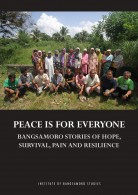 Peace is for Everyone: Bangsamoro stories of hope, survival, pain and resilience
Peace is for Everyone: Bangsamoro stories of hope, survival, pain and resilience
Author: Abhoud Syed M. Lingga
Published by: Centre for Peace & Conflict Studies (CPCS) and Institute of Bangsamoro Studies (IBS)
Publication date: June 2016
ISBN: 13:978-9924-9044-0-3
This publication presents the stories of almost 300 ordinary Bangsamoro men and women in the provinces of Maguindanao, Cotabato Province, Sultan Kudarat, Lanao del Sur, Lanao del Norte, Zamboanga Sibugay, Zamboanga del Sur, Basilan, Sulu and Tawi-Tawi, and the cities of Marawi, Iligan, Cotabato and Isabela. These men and women shared their experiences regarding the last decades of conflict in Southern Philippines throughout 2015, and voice their hopes for a peaceful, better and more harmonious future.
Peace is for Everyone uses a Peace History approach to explore the intersections between personal experiences and collective accounts. By weaving together a diverse range of individual stories, opinions and sentiments, the book presents a complex, nuanced, rich description of the situation on Mindanao following the signing of the peace agreement between the MILF and the Government of the Philippines in 2014.
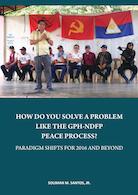 How do you solve a problem like the GPH-NDFP Peace Process? Paradigm shifts for 2016 and beyond
How do you solve a problem like the GPH-NDFP Peace Process? Paradigm shifts for 2016 and beyond
Author: Soliman M. Santos, JR
Published by: CPCS
Publication date: May 2016
ISBN: N/A
How do you end a protracted, seemingly intractable, conflict that has lasted for more than 40 years? And how do you do it in a context of exhaustion and disillusion?
This collection of articles by Judge Sol Santos, presents a thoughtful analysis of the peace process between the Government of the Philippines and the CPP-NPA-NDFP over the last decade. They propose alternative solutions to on-going challenges whilst highlighting the role of civil society and affected communities.
At the core of Judge Sol’s writing stand those directly affected by the conflict: those holding arms at both sides of the divide, those caught in the midst of it: the internally displaced, the wounded, the dead ones, their families, friends and comrades. As this book shows: “A peace process is easier promised than done”. However, there is a moral obligation to continue pushing for a negotiated solution. These articles call for a change of attitude among those involved in the negotiation.
The time is now.
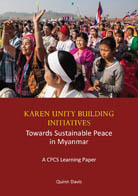 Karen Unity Building Initiatives: Towards sustainable peace in Myanmar
Karen Unity Building Initiatives: Towards sustainable peace in Myanmar
Author: Centre for Peace & Conflict Studies (CPCS)
Published by: CPCS
Publication Date: January 2016
ISBN: N/A
In light of ongoing unity-building measures in Myanmar, Karen Unity Building Initiatives: Towards sustainable peace in Myanmar examines the Karen history of conflict, seeking to analyse the push for greater unity amongst the Karen.
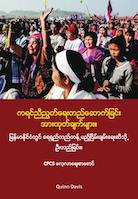 The paper explores Karen opinions and experiences of unity building, derived from conversations with Karen individuals from various communities, civil society organisations (CSOs), armed groups, political parties and government offices. Karen Unity Building Initiatives also draws upon on information from conversations held with 111 community members across Karen State who shared their opinions on the current peace process in Myanmar in 2014.
The paper explores Karen opinions and experiences of unity building, derived from conversations with Karen individuals from various communities, civil society organisations (CSOs), armed groups, political parties and government offices. Karen Unity Building Initiatives also draws upon on information from conversations held with 111 community members across Karen State who shared their opinions on the current peace process in Myanmar in 2014.
These conversations formed the basis of the Centre for Peace and Conflict Studies publication Listening to Communities: Karen State.
The Journey of the Moro Islamic Liberation Front’s First Ex-Combatants
Author: Centre for Peace & Conflict Studies (CPCS)
Published by: CPCS
Publication Date: December 2015
ISBN: 9789996381799
On June 16, 2015 a Ceremonial Turnover of Weapons and Decommissioning of the Moro Islamic Liberation Front (MILF) combatants was held at the old Capitol Building in Sultan Kudarat, Maguindanao. On that day, 145 Bangsamoro Islamic Armed Forces (BIAF) combatants were registered and processed to formally commence their return to full civilian lives. In late July 2015, the Centre for Peace and Conflict Studies (CPCS) was invited by the MILF to interview 10 of these men. This publication is the result of those conversations. It brings out the voices of these 10 men who had just, a few weeks earlier, put their arms to rest. What these men’s reflections show is that decommissioning is a tool for peace; that it is not an end in itself but a means to a different life.
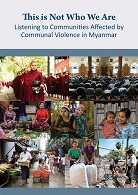 This is Not Who We Are: Listening to communities affected by communal violence in Myanmar
This is Not Who We Are: Listening to communities affected by communal violence in Myanmar
Author: Centre for Peace & Conflict Studies (CPCS)
Published by: CPCS
Publication Date: September 2015
Using CPCS Listening Methodology, this publication elevates community voices from six locations in Myanmar that experienced communal violence to reveal a strong alternative narrative to the one commonly heard on the issue. Conversations were held in November 2014 with 220 community members from Meiktilla, Mandalay Region; Lashio, Shan State; Mandalay, Mandalay Region; Shwebo district, Sagaing Region; West Bago, Bago Region; and Sittwe, 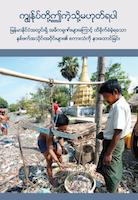 Rakhine State. Community members discussed their perspectives and opinions in light of their experience of communal violence and their hopes and desires for peaceful co-existence in the future. Key topics and themes were identified to form the basis of the discussions, which were then catalogued and prioritised by the listening teams who spoke with the communities.
Rakhine State. Community members discussed their perspectives and opinions in light of their experience of communal violence and their hopes and desires for peaceful co-existence in the future. Key topics and themes were identified to form the basis of the discussions, which were then catalogued and prioritised by the listening teams who spoke with the communities.
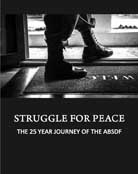 Struggle for Peace: The 25 Year Journey of the ABSDF
Struggle for Peace: The 25 Year Journey of the ABSDF
Author: CPCS
Published by: Centre for Peace and Conflict Studies
Publication Date: April 2014
ISBN: 978 9 996 38171 3
Expressed through the voices of All Burma Students Democratic Front (ABSDF) members, this book tells the story of the organisation’s birth from the August 8, 1988 student uprising through its 25 years of living and fighting in the remote jungle areas of the country. It provides an in-depth examination of the experiences of ABSDF members, from their time as protesting students, to revolutionaries, to their current involvement in the Myanmar peace process. From hardships caused by disease and food supplies, to the fears, hopes, joys and disappointments of young men and women trying to realise their dream of fighting against oppression, Struggle for Peace takes readers on a journey of change and transformation.
No failure in peace work – the life and teaching of Dekha Ibrahim Abdi
(2nd edition)
Author: Dekha’s friends, family and former colleagues
Publication Date: May 2014
ISBN: 9789996381720
This book pays tribute to the great peace builder Dekha Ibrahim Abdi and is an attempt to capture her theory and practice. This is a second and enlarged edition of the book, comprising new contributions from Dekha’s dear friends and colleagues.
Widening the Table: Hybrid Support Groups in Conflict Mediation
Author: Emma Leslie
Publication Date: 17 December 2013
ISBN: n/a
Arguing that conflict is not static, Emma Leslie stresses the need to find innovative, more holistic approaches to conflict mediation. Emma reflects on her experience with the new model of hybrid support groups in conflict mediation.
UNDP Community of Practice Conference – Keynote Address
Author: Emma Leslie
Publication Date: October 14th 2013
ISBN: n/a
Arguing that conflict in Asia is not static Emma Leslie stresses the need for peace workers to reframe analysis, frameworks and ourselves to engage effectively in peace building and conflict transformation.
Letting the Other In: Conflict prevention in Myanmar
Author: Emma Leslie
Publication Date: September 2013
ISBN: n/a
In this article Emma Leslie gives an insight into the Centre for Peace and Conflict Studies’ peace work in Myanmar. She discusses the importance of cultural humility and of adopting and open approach in peace work. Furthermore, she emphasises that trust is essential in order to foster relationships that allow for more effective peace practices and programs.
Innovation in mediation support: The International Contact Group in Mindanao
Author: Kristian Herbolzheimer and Emma Leslie
Conciliation Resources, London
Publication Date: July 2013
ISBN: n/a
This paper reflects on Conciliation Resources’ experience of formal hybrid mediation support in the Mindanao peace process. Key lessons are drawn from this new approach and its potential for further use in the field of mediation and conflict transformation is evaluated.
Supporting Peace Processes in South East Asia: How not to be a bull in a China shop?
Author: Emma Leslie, Swiss Peace, CPCS
Publication Date: June 2013
ISBN: n/a
This summary shares some of CPCS’s Director, Emma Leslie’s, lessons learnt from third party interventions in South East Asian peace processes; highlighting useful skills and approaches while touching on potential pitfalls in this setting.
Embedding Feedback Mechanisms: Bringing Voices from the Ground to the GPH-MILF Peace Talks
Author: Elizabeth M. Padilla
Centre for Peace and Conflict Studies
Publication Date: November 2011
ISBN: n/a
Researched and authored by CPCS staff Elisabeth Padilla, this publication attempts to develop and integrate a mechanism to feedback the voices of victims of violence at the local level to the higher level discussions.
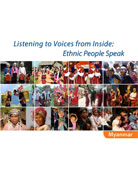 Listening to Voices from Inside: Ethnic People Speak
Listening to Voices from Inside: Ethnic People Speak
Author: CPCS, Siem Reap
Publication Date: June 2010
ISBN: 9789995091958
Using the listening research methodology, this publication seeks to amplify the unheard voices of ethnic people living inside Myanmar, aiming to provide a better understanding of their situation and most pressing needs.
Listening to Voices from Inside: Myanmar Civil Society Response to Cyclone Nargis
Author: CPCS, Siem Reap
Publication Date: July 2009
ISBN: n/a
This is the first in a series of publications which raise the voices of people from inside Myanmar. This paper focuses on the civil society response to Cyclone Nargis concluding that despite the political situation at the time there was still space for a dynamic, varied and active civil society to operate in Myanmar.
Perspectives of the Subanen Tribe on the New Bangsamoro Political Entity
Published by: Centre for Peace and Conflict Studies
Publication Date: February 2014
ISBN: n/a
This paper seeks to identify the perspective of the Subanen, one of Mindanao’s non-Muslim indigenous tribes, towards the New Bangsamoro Political Entity (NPBE). The research helps to provide a better understanding of the Subanen view on the NPBE, clarifies the concerns of the tribe and details specific policy recommendations.
Transforming Ethnic Conflicts in Manipur through Ningol Chakouba
Author: Meitei Rajkumar, Bobichand and Longjam,Surekha
Published by: Centre for Peace and Conflict Studies
Publication Date: February 2014
ISBN: n/a
Presented at the 2013 Peace Practitioners Research Conference, the objective of this action research is to examine the impact and scope of the emerging role of Ningol Chakkouba in achieving more conscious inter-ethnic relationships in Manipur, finding constructive ways for building peace between divided communities.
From Street Fighters to Peace Builders: The Stories of Transformation in Timor Leste’s Martial Arts leaders
Author: CPCS, Siem Reap
Publication Date: August 2010
ISBN: n/a
This book documents peacebuilding activities from a number of international organisations working in Timor Leste following its struggle for independence. More specifically it follows the successes and challenges of a training programme aimed at transforming martial arts leaders from agents within a culture of violence, to agents of peace.
Identifying Effective Measures to Combat Organised Crime in Post – Conflict Nepal Author: Manoj Kumar, Nepal This paper analyses the reasons for the dramatic increase in organized crime in Kathmandu after the signing of the Comprehensive Peace Agreement and identifies effective measures to combat such crime.
Publication Date: June 2013
ISBN: n/a
Resolving Conflict in Muslim Mindanao: Showcasing Four Traditional Methods
Author: Datumanong, Abubakar; Pigkaulan, Parido Rahman; Makalingkang, Maguid; Uka-Lingga, Juwairiya
Institute of Bangsamoro Studies, Centre for Peace and Conflict Studies
Publication Date: November 2013
ISBN: 9789996381706
Showcasing different traditional dispute resolution mechanisms from Mindanao, this publication attests to the contribution of local populations in working towards peaceful societies, and the inherent value of embracing and incorporating indigenous structures and mechanisms into formal practices.
National Apologies: Mapping the complexities of validity
Author: Eneko Sanz
CPCS, Siem Reap
Publication Date: April 2012
ISBN: n/a
This mapping exercise seeks to provide a better understanding of national apologies by analysing the nuances associated with the term while studying examples of apologies made by states to their people.

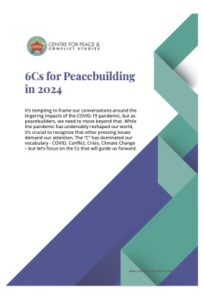 6Cs for Peacebuilding
6Cs for Peacebuilding 